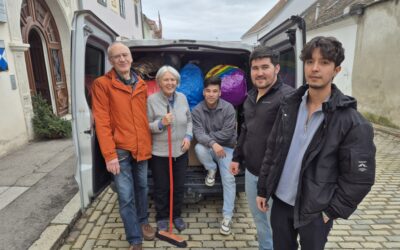 Australia, a land for the new evangelisation? There are many who believe that it is, because of different reasons. This country is quite multicultural and continues to be so with a recent influx of immigration from Asia; the crisis in the Catholic Church because of the sexual abuse of minors; the persuasive force of consumerism; the presence of youths from around the world and not only children of local families; numerous mixed marriages; the ecumenical and interreligious challenge. The list could go on, leaving no doubt in anyone’s mind about the need for an evangelisation in this country as well. But it would have to be first of all a re-evangelisation of the Christian life of the individual.
Australia, a land for the new evangelisation? There are many who believe that it is, because of different reasons. This country is quite multicultural and continues to be so with a recent influx of immigration from Asia; the crisis in the Catholic Church because of the sexual abuse of minors; the persuasive force of consumerism; the presence of youths from around the world and not only children of local families; numerous mixed marriages; the ecumenical and interreligious challenge. The list could go on, leaving no doubt in anyone’s mind about the need for an evangelisation in this country as well. But it would have to be first of all a re-evangelisation of the Christian life of the individual.
During the visit of Focolare president Maria Voce and co-president Giancarlo Faletti, the local Focolare community wished to pause and publicly question itself concerning the new frontiers of evangelisation in Australia and its own contribution toward this. Above all by offering “good practices”, small but great witnesses to ecclesial life, work in public office, living with unemployment, commitment in hospitals, rejecting clientelism, education and family life. The simple Gospel lived in a society where competition is encouraged and in which individualism often wins out over altruism and corporate interests over the common good.
 Maria Voce spoke before an audience that included professors and journalists, religious leaders and professionals about the cornerstones of the Focolare’s style of evangelisation, which is to live the Gospel in order to continually re-evangelise ourselves, sharing with each other what the Gospel life has brought about in our lives, finding longer moments in which to experience the power of God’s love together. By acting in this way you finally manage to have a deep impact on environments that before could have seemed impenetrable by the Gospel, from parliaments to factories, from sport arenas to charitable institutions. This evangelisation is one that happens outside the church building. One convincing example was offered by Giancarlo Faletti concerning Rome, Italy. In 2000 after Chiara Lubich had been awarded honorary citizenship, she launched a project for the revitalization of urban life, which she called RomaAmor (Rome-Love).
Maria Voce spoke before an audience that included professors and journalists, religious leaders and professionals about the cornerstones of the Focolare’s style of evangelisation, which is to live the Gospel in order to continually re-evangelise ourselves, sharing with each other what the Gospel life has brought about in our lives, finding longer moments in which to experience the power of God’s love together. By acting in this way you finally manage to have a deep impact on environments that before could have seemed impenetrable by the Gospel, from parliaments to factories, from sport arenas to charitable institutions. This evangelisation is one that happens outside the church building. One convincing example was offered by Giancarlo Faletti concerning Rome, Italy. In 2000 after Chiara Lubich had been awarded honorary citizenship, she launched a project for the revitalization of urban life, which she called RomaAmor (Rome-Love).
 Maria Voce did not try to hide the fear that the Movement felt at the death of its founder. But the fruits of evangelisation that are, after all, nothing more than the life of the Gospel very soon crushed that fear. These fruits demonstrated that focolare spirit still had much to give to today’s society. This was also noticed by many who attended the recent Synod on the New Evangelisation in which many bishops shared with Maria Voce who was an auditor at the Synod, the many Gospel fruits that they had seen continuing to come forth from the Movement.
Maria Voce did not try to hide the fear that the Movement felt at the death of its founder. But the fruits of evangelisation that are, after all, nothing more than the life of the Gospel very soon crushed that fear. These fruits demonstrated that focolare spirit still had much to give to today’s society. This was also noticed by many who attended the recent Synod on the New Evangelisation in which many bishops shared with Maria Voce who was an auditor at the Synod, the many Gospel fruits that they had seen continuing to come forth from the Movement.
Among those present there was also Professor James Bowler, a well-known Australian geologist, who discovered the remains of the oldest human being on the continent known as Mungo Lady and Mungo Man. Surprised by the great turnout, he commented: “It was a moment of great spirituality and openness. The recognition of the other is the right path for a just and coherent social life.” Professor Anne Hunt head of the Theology department at the University of Melbourne underscored “the importance of the presence of the new movements in the new evangelisation, which are able to open unique and original horizons for the faith and for the Catholic Church in fields that are otherwise deserted, especially in the professions and in the media.”
By Michele Zanzucchi
Source: Città Nuova




0 Comments